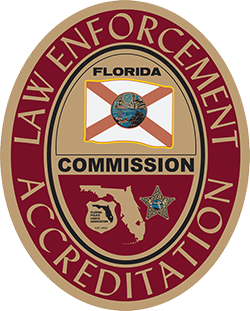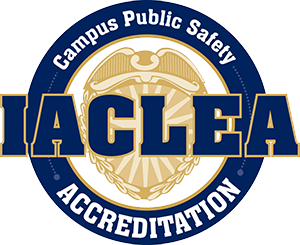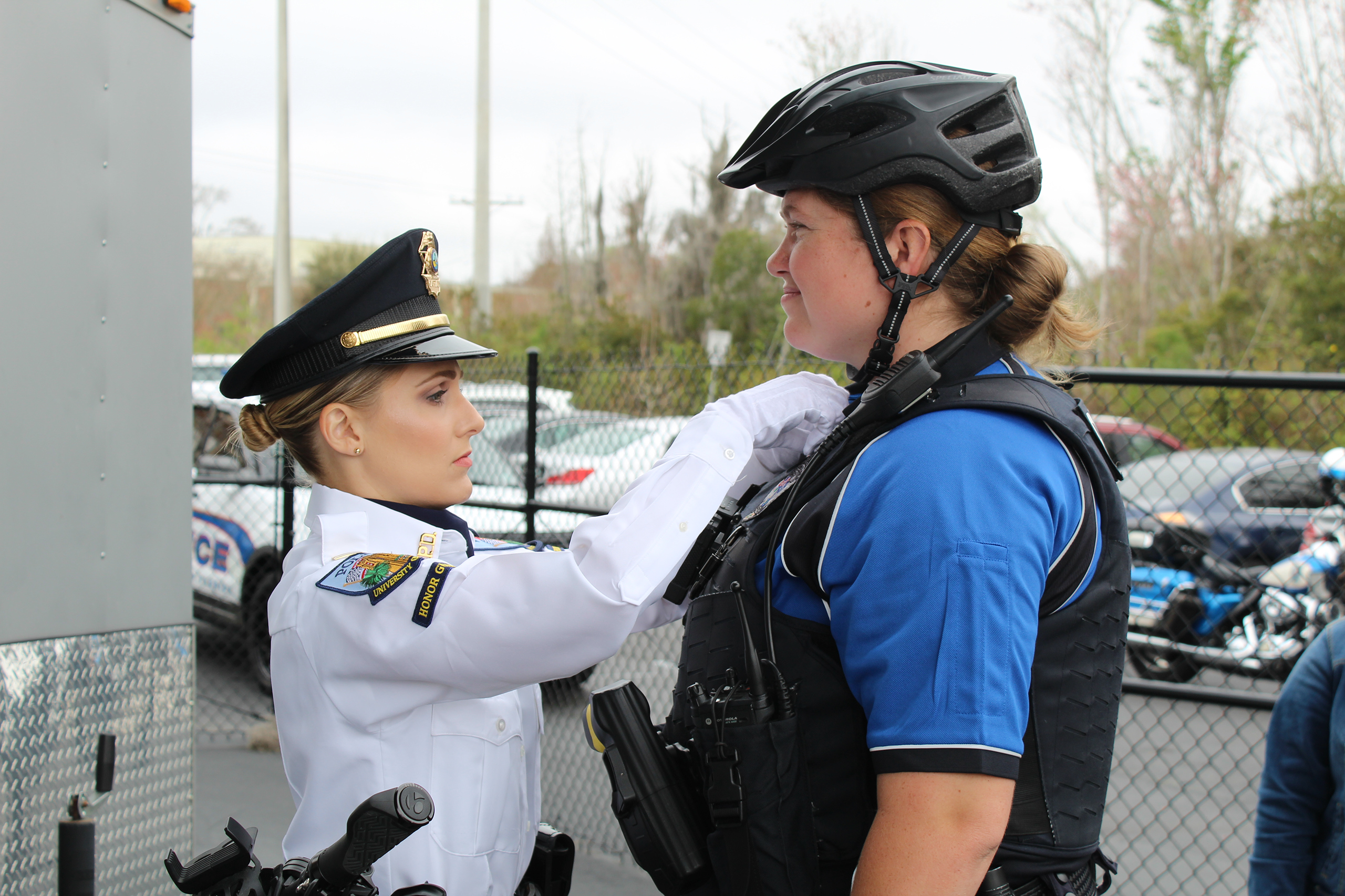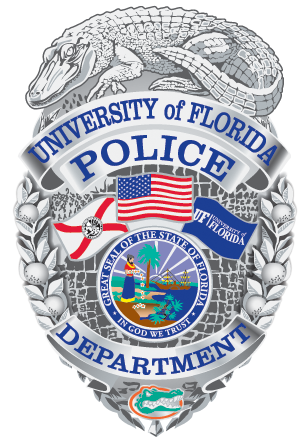
Justice: All department members are committed to the administration of law and order based on the constitutional idea of justice for all where every citizen will be treated with dignity, fairness, and respect.
Professionalism: All department members will display attitudes, actions, and behaviors that result in serving the highest interests of the campus community above their own.
Trust: All department members will conduct themselves in a manner worthy of the university community by exercising wisdom, compassion, and commitment to honesty and justice.
Service: As members of a law enforcement agency, we recognize that we are servants of the public. As such, we are duty-bound to the highest level of community service in the protection of life and property.
Integrity: All department members are expected to espouse the highest moral standards, always conducting themselves in a manner that is fair, ethical, legal and that portrays a sense of duty and honor.
As a law enforcement officer, my fundamental duty is to serve the community: to safeguard lives and property; to protect the innocent against deception, the weak against oppression or intimidation and the peaceful against violence or disorder; and to respect the constitutional rights of all to liberty, equality and justice.
I will keep my private life unsullied as an example to all and will be have in a manner that does not bring discredit to me or to my agency. I will maintain courageous calm in the face of danger, scorn or ridicule; develop self-restraint; and be constantly mindful of the welfare of others. Honest in thought and deed both in my personal and official life, I will be exemplary in obeying the law and the regulations of my department. Whatever I see or hear of a confidential nature or that is confided to me in my official capacity will be kept ever secret unless revelation is necessary in the performance of my duty.
I will never act officiously or permit personal feelings, prejudices, political beliefs, aspirations, animosities or friendships to influence my decisions. With no compromise for crime and with relentless prosecution of criminals, I will enforce the law courteously and appropriately without fear or favor, malice or ill will, never employing unnecessary force or violence and never accepting gratuities.
I recognize the badge of my office as a symbol of public faith, and I accept it as a public trust to be held so long as I am true to the ethics of police service. I will never engage in acts of corruption or bribery, nor will I condone such acts by other police officers. I will cooperate with all legally authorized agencies and their representatives in the pursuit of justice.
I know that I alone am responsible for my own standard of professional performance and will take every reasonable opportunity to enhance and improve my level of knowledge and competence.
I will constantly strive to achieve these objectives and ideals, dedicating myself before God to my chosen profession…law enforcement.
The University of Florida Police Department reviews our internal policies and procedures on an ongoing basis, which demonstrates our commitment to best practices. The following UFPD Directives speak to and address the recommendations raised by the #8CantWait campaign, and we are committed to continually reviewing of all of our related Directives and enacting changes to clarify Directives and procedures for officers.
UFPD is currently engaging in efforts and actions across the University and Gainesville community to improve our understanding of, response to, communication with, and training about the diverse cultures within our community. We appreciate our community in helping us better ourselves and we encourage you to visit our website to learn in detail about each program:
On an annual basis, UFPD conducts a review of the deployment of response to resistance over the prior year. A document detailing the individual instances where response to resistance was used is compiled and made available to the public.
2025 Response to Resistance Analysis
2024 Response to Resistance Analysis
2023 Response to Resistance Analysis
2022 Response to Resistance Analysis
2021 Response to Resistance Analysis
2020 Response to Resistance Analysis
2019 Response to Resistance Analysis
The law enforcement accreditation program is recognized as a means of maintaining the highest standards of professionalism. Accreditation is awarded by an independent reviewing committee who conducts an on-site evaluation of the agency. Attaining accredited status demonstrates to the community that an agency is committed to maintaining the highest standards of professional law enforcement service. The accreditation of an agency is awarded for a set period of time upon which the agency must apply for re-accreditation.

The Commission on Accreditation for Law Enforcement Agencies, Inc. (CALEA®), was created in 1979 as a credentialing authority through the joint efforts of law enforcement’s major executive associations:
The CFA was established by charter December 13, 1994 and incorporated on February 9, 1995. It is an independent, not-for-profit corporation designated as the accrediting body for Florida law enforcement and inspectors general accreditation. The Commission’s purpose is to establish a program for accreditation that can be achieved by all Florida law enforcement agencies and Inspectors general investigations offices. The Commission is comprised of 15 volunteer members:


IACLEA was created by 11 college and university security directors who met in November of 1958 at Arizona State University to discuss job challenges and mutual problems and to create a clearinghouse for information on issues that campus public safety directors across the country share. Today, IACLEA has more than 4,200 members representing 1,000+ institutions of higher education in 11 countries.
CIRT was created at the request of the Florida Board of Governors after the Virginia Polytechnic Institute and State University shooting in 2007 that left 33 people dead, including the shooter, who was a student in his senior year. The importance of CIRT continued to be apparent in 2014 after three people were shot at a Florida State Library, also leaving dead the shooter, an FSU graduate.
These officers are dispersed throughout the Department in the hope of having at least one additionally trained officer working at all times. According to the FBI, 80% of active shooter incidents in 2019 were stopped by law enforcement. And shooters were more likely than previous years to wear body armor, which reinforces the need of responding officers to have greater fire power than the traditional handgun. Research has also shown that more than 70% of active shooter incidents are over in five minutes or less. Although GPD and ASO have officers trained in advanced tactics, their response time would be well outside the average five minutes.The geography and access controls of campus would greatly hinder their response as well.
Although this supports the importance of having UFPD officers trained and equipped to respond to active shooters on campus, the University recognizes seeking to avoid these tragedies is the preferred result. As such, UFPD and UF continue to be dedicated to supporting prevention efforts through threat assessments and community education.

The UFPD Training Division provides in-service training twice a year to sworn UFPD employees in order to meet and exceed the continuing education/training requirements as outlined by the Florida Criminal Justice Standards and Training Commission (CJSTC).
The Mission of the University of Florida Police Department (UFPD) is to provide protection and service to the University community. The UFPD is committed to the prevention of crime and the protection of life and property; the preservation of peace, order, and safety; the enforcement of laws and ordinances; and the safeguarding of constitutional guarantees. With community service as the foundation, the UFPD is driven by goals to enhance the quality of life, investigating problems as well as incidents, seeking solutions and fostering a sense of security through programs reflecting the needs and desires of the community. The UFPD nurtures public trust by holding itself to the highest standards of performance and ethics.
For more information about your SCOPE Officer, please review the SCOPE Bulletin Board posted within your residence hall or Graduate and Family Housing common area.
